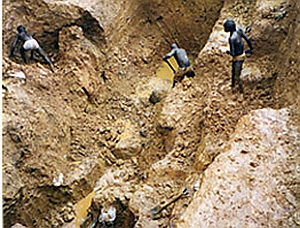Making Africa’s Natural Resources to Benefit Africa

 |
| A mining scene in Angola Photo courtesy |
It has been argued that for many of our countries, mineral resource endowment and exploitation have been a curse and source of conflicts rather than a blessing. While these resources have assisted in powering economic growth in developed and emergent countries, their contributions to meeting the challenges of sustainable development and improving living conditions within Africa have been negligible. Recent UN reports indicate that while other developing regions are making progress towards the Millennium Development Goals (MDGs) if the current trend in Africa persists, the continent is unlikely to achieve the goals by the target date of 2015.
Africa was not much affected under the Financial Crisis and its outbreak in most developed economics. The continent, however, can not escape it when it is spreading globally today. First, foreign direct investment (FDI) shall shrink in Africa, opinions on FDI prospects are not so optimistic with the increasing impact of the world financial crisis. Second, the current global financial crisis has directly affected the exports of raw materials and the tourism industry in Africa. Third, remittances to some African countries from overseas immigrants have decreased by a significant margin.
According to the International Monetary Fund (IMF)'s World Economic Outlook, African economic growth rate slowed down, and growth is estimated at 5.2 percent and 2.8 percent for 2008 and 2009 respectively, apparently much lower than the figure of 6.1 percent in 2007. Consequently, in many of our countries, poverty is deepening and increasing. The achievement of rapid and sustainable development still seems to be out of reach of most of Member States of AU.
Demand for natural resources will remain high and will pick up again when the financial crisis is over. The challenge therefore, is to put in place strategies, policies, and programmes that will ensure that mineral resources endowment and exploitation become an important instrument for the promotion of rapid and sustainable economic growth and development in Africa.
One of the basic tenets of good government is the allocation of adequate resources to meet the demand of economic development that benefit the people. Therefore, real social development is that which seeks to ensure that economic growth is associated with sustainable development and social equity. Government in partnership with the stakeholders should cooperate to strengthen peace, stability, and create a favorable environment for development. It is believed that when communities, government, and industry are in partnership for progress, they will create an innovative synergy to minimize conflict and enhance the benefits and rewards to parties involved.
The second belief is that efforts should also involve those emerging economies like China, India and Brazil which are increasing their roles as major global players and investors in the mineral resources sectors. This is, for instance, the approach promoted in the recent African Union Commission proposals for an Africa-emerging economics dialogue and cooperation on peace, stability and sustainable development. Environment and natural resources have been identified as a key area for such enhanced cooperation, which has started pragmatically with a few pioneer projects.
In June 2007, under the Decision on the management of Africa’s natural resources, the Executive Council at its Eleventh Ordinary Session, held in Accra, Ghana requested the Commission to organize a meeting of Ministers Responsible for Mineral Resources in Member States to reflect on Major issues pertaining to the exploitation and management of natural resources as catalyst for development. In response to this, in mid October 2008, the AUC in close collaboration with UNECA organized in Addis Ababa, Ethiopia, the First African Union Conference of Ministers Responsible for Mineral Resources under the theme “Building a sustainable future for Africa’s extractive industry: The imperatives.”
The Conference proposed to African leaders a strategic vision for the management of Africa’s natural resources in order to promote, growth, poverty reduction and sustainable development in Africa. The First African Union Conference of Ministers Responsible for Mineral Resources Development has marked a migration in the strategic orientation towards strengthening forward planning and management capacity of African institutions, including capacity to negotiate natural resources agreements and contracts.
In addition, the Conference recommended building upon the work of the ISG and to articulate strategies to enhance the value chain and to improve the linkages between the natural resources sector and other sectors of the economy. The Ministers recommended, among other issues, the evaluation of the requirements to develop African codes and guidelines to improve governance, transparency, environmental stewardship, and social safeguards in the development of natural resources on the continent.
Since its inception in 2007, the ISG have worked very hard in the formulation of a framework report setting out fundamental perspectives from the development of detailed tools dealing with particular aspects of mineral regimes, and made recommendations on how to make mining play a central role in the promotion of sustainable economic growth and development. I am optimistic that the Africa mining vision can be realized.
By Mr. Ayoup Zaid,
Senior Policy Officer for Industry in the Department of Trade and Industry of the African Union Commission
